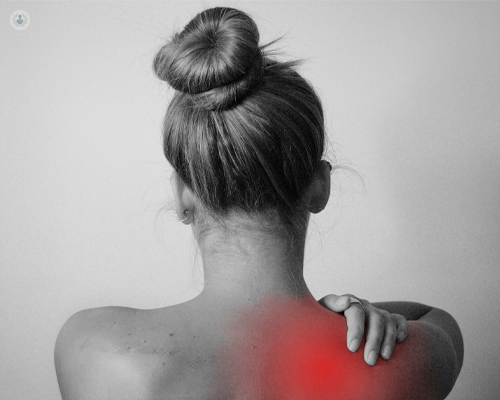What signs and symptoms indicate a rotator cuff injury?
Autore:Top Doctors recently had the pleasure of speaking with distinguished consultant orthopaedic surgeon, Mr Abhinav Gulihar. In this article, Mr Gulihar outlines the main signs and symptoms that normally indicate a rotator cuff injury, and tells us what treatment options are available to patients who have injured their rotator cuff.

What is the rotator cuff?
The rotator cuff is a group of four muscles and tendons that encircle one’s shoulder joints. They are hugely important when it comes to the stability of the shoulder, as well as the function of the shoulder. An injury to one of these structures can lead to pain and potentially shoulder dislocation.
What signs and symptoms indicate a rotator cuff injury?
Rotator cuff injuries can be caused by trauma, or wear and tear. When a rotator cuff injury occurs after a significant fall, the majority of patients will experience severe shoulder pain that may or may not improve within a few weeks. On top of this, they may suffer quite a lot of weakness and loss of motion in the shoulder.
If the shoulder pain has developed over time, it is highly likely that it is a rotator cuff injury, and it could be a significant tear. Medical advice should be sought for both incidents.
When should I see a doctor for shoulder pain?
Patients who notice a lot of pain and a loss of movement in the shoulder should seek medical advice within two to three weeks. If your shoulder pain has been there for a while, it is reasonable to see a physiotherapist initially, who can help strengthen the shoulder. If this does not relieve a patient’s shoulder pain, an orthopaedic specialist should be seen.
Should I abstain from exercise with a rotator cuff injury or shoulder pain?
It is really important that you keep your shoulder as active and mobile as possible. A lack of movement can make a patient develop frozen shoulder, which can become quite serious and problematic.
Intense exercise should be avoided. Patients are encouraged to keep moving the shoulder through a pain-free range of motion.
Is treatment always necessary for this type of injury?
It depends on whether it is a tear due to trauma or due to wear and tear. If the tear has occurred as a result of trauma, it is quite likely that patients will require keyhole repair surgery of the rotator cuff.
In some specific cases of trauma, tears have only gone through a partial amount of the tendon. In these cases, physiotherapy and/or steroid injections can be effective and sufficient treatment options.
If the rotator cuff injury happens as a result of wear and tear and there is only a small amount of pain, then it is always preferable to undergo physiotherapy as well as steroid injections.
Mr Abhinav Gulihar is a well-respected and experienced consultant orthopaedic surgeon. Consult with him today if you are experiencing shoulder pain. You can do just that via his Top Doctors profile.


